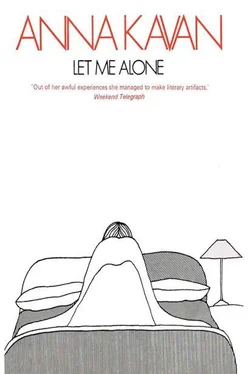‘Yes, I shall like to see it,’ she answered. ‘But this is a place to live in.’
That was how she thought of the East; as a place to visit. But when she thought of settling down there, of living there permanently, her mind went blank and would not function. She simply could not think of it in that way.
At last it was time to go. The sun was falling towards the sea, shadows were creeping on the mountain slopes. Anna slipped off alone. She could not leave the place just yet. It was friendly and delightful to her. She could not understand how Matthew saw only the squalor and the fishes’ heads lying about. To her there was beauty in the steep houses, unevenly roofed, against the hillsides, very subtle and appealing.
She came to a path, steep, stony, and narrow, a sort of mule-track, between stone walls. One wall was in deep shadow, but the other still caught the sun and glowed yellowly. Small brown lizards were flicking and darting between the stones. On one side were houses, falling below the level of the track; above the other wall the grey heads of olives were appearing.
Anna climbed on the stones, and looked over at the olive grove. It was still and lovely, with the ancient, knotted trunks, weird-looking, standing strangely in their own purplish twilight, like old ghosts upon earth. The pale, dry grass grew up close to the exposed, gnarled roots of the trees. And there were the leaves up above, so dry and delicate, hanging in ashen showers, light as ashes, and much brighter, and silvery, tarnished-silvery like a dissolving storm-cloud, making a mysterious, pale cloudiness of their own in the upper air. The beautiful, ancient olive trees, mysterious and age-old, they had stood there for ever and ever. Nothing could be more poignant, like an apparition from Genesis.
She saw a young man sketching under the trees, sitting on a stone, half-turned from her, dipping and poising his brush. He looked intent, and seemed to be working quickly. The light changed from moment to moment.
Anna’s clear eyes, lingering on him, watched his profile tilted above the paper. The young man was thin, and looked elegant and rather well-bred and intelligent. He had the look of a certain type of young artist — careless, engaging, with a touch of the poseur, but amiable, very. Anna took him all in, even to the tip of his rather high, rather fine nose. But he was out of the picture. Resenting the intrusion of a human figure upon the solitary perfection of the place, Anna moved off to Matthew and the waiting car.
On subsequent days they drove also, to Bandol and Sanary, and places farther down the coast: La Ciotat with the strange, stark hulls of half-built ships sheering up in the curved harbour. But to Cassis they did not go again.
It was Anna who wanted the drives. Matthew really disliked them. He was so unutterably opposed to everything — opposed to the vineyards, the mountains, opposed to Anna’s self-sufficient enjoyment. He hated the spruce little Frenchman who drove the car: the way he jumped out so assiduously to open the door for Anna, and the way he sometimes turned round while they were driving, turning his sunburnt, plump cheeks and his small black moustache to smile at Anna, confidentially, as though they were in league together. Poor Matthew felt horribly out of it. And he hated the French people, the peasants and the little townspeople, whom he saw about. He couldn’t abide their casual, unhurried way of living. It roused a subterranean anger in him to watch them sauntering and lounging and sitting round little tables in the sun. They had no right to take life so easily. Even when they appeared to be busy or working hard in the fields, it was all a sort of game — just playing at work. So it seemed to Matthew. And at the bottom of his heart an angry resentment came; because these people seemed so ‘happy,’ in a way which he and his conscientious kind could never, never understand.
The day before the boat sailed, he met in the Cannebière some acquaintances, a Mr. and Mrs. Brett, who were also going to travel on the Henzada. It was an enormous relief to him to see them. It was really rather pathetic the way he cottoned to the quite insignificant pair, and the way all three of them clung together like drowning swimmers in this sea of foreignness. They seemed to unite at once in a triangular bond of opposition — with Anna standing outside. The Bretts were kindly disposed towards her. They wanted to include her in the bond. But when they saw that she would not be included, they disapproved. They went their own way — with Matthew — and Anna went hers. She turned away from the uninteresting, middle-aged couple and went out alone.
She walked to the garage and found the trim little driver. And set out with him in the snub-nosed Renault to have a last look at Cassis.
It was fine, with the lightest, most delicate sunshine, like early summer, and a haze over the mountains. But the breeze came cold from the sea, to the pine-trees and the changing, cloud-pale olives. The olives were always changing. In stillness they were all grey shadow, but quickly the sharp breath of the sea wind came to blow them into tremulous, smoky, silver fires.
Anna sat in the jolting car and looked about. It pleased her to be sitting there by herself behind the little French driver. From the back of his head, a sort of light-hearted French gallantry seemed to extend towards her; as though in an admiring, deferential, quite respectful, but not very serious way, he had made himself responsible for her welfare. She smiled to herself, feeling this.
At Cassis he skipped out with alacrity to open the door, and smiled at her with the rather precocious, rather impudent admiration that always amused her. His smallish black eyes rolling gaily, and an exaggerated, comic-opera devotion on his plump face, as though he would die for her. But she left him at the cafe and walked up to the olive grove alone.
She would not admit that she was thinking of the young artist; but when she saw him under the trees she was not very surprised. She looked down the vista of tree boles and dim grass, and saw him sitting on a stone against the wall, bare-headed and in a cardigan, dabbing away with his pointed brush. She knew him at once by his high, thin nose. And, although she could not see him very distinctly because of the leaves and the branches, she saw something that attracted her in him. His elegance, his youthfulness, something careless and a trifle thrilling. She was glad to get this second glimpse of him.
She walked towards him, over the short, dry grass. He looked up and saw her. She smiled in a shining, subtle fashion, changing her remote, coldly observant face.
‘May I see the picture?’ she asked, in French.
He curved his rather pale lips in an answering smile, and held out the sketch at arm’s length, so that she might look at it.
‘Is it finished?’ said Anna.
The young man looked up at her, and nodded, smiling. He was a handsome fellow, with a rather aristocratic, narrow face, and with a well-balanced appearance, graceful and debonair, and rather informal. Anna was pleased by the gay, mischievous look in his large, bold eyes. The pale, flexible curve of his mouth made him seem like a satyr to her. She looked at him inquiringly, waiting for his voice. But he only went on smiling his odd, wide, satyr’s smile.
She looked away at the sketch, which was somewhat wild and extravagant, with a great singing of blues and yellows. Anna knew nothing of painting. But he seemed to have caught a little of the day’s spirit in the strong tones.
‘I don’t know if it’s good. But I like it,’ she said.
Still he did not speak until her eyes compelled him. Then:
‘It is not very good,’ he said, rather stiltedly, to answer her.
‘You’re English!’ she cried, a little shrill with astonishment. And she watched the remarkable, pale smile growing on his mouth. It rather thrilled her to see it. His eyes twinkled with mischievous, wayward warmth, engaging: but his mouth was somehow thrilling to her.
Читать дальше












